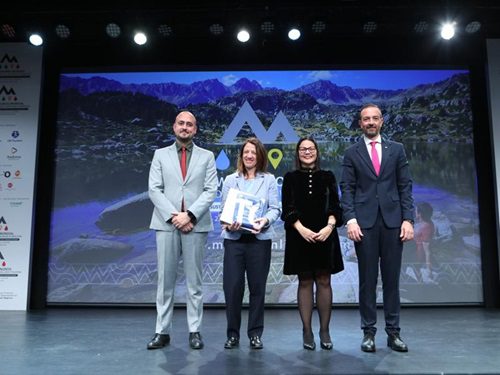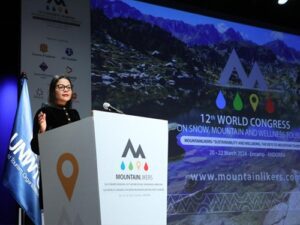 The 12th World Congress on Snow, Mountain, and Wellness Tourism casts a pioneering vision in a world where travel often treads a delicate balance between exploration and preservation. This gathering of minds, held against the backdrop of the United Nations’ Five Years of Action for the Development of Mountain Regions, unfolds a new chapter in tourism that embraces the awe-inspiring beauty of high-altitude landscapes and the well-being of its communities and ecosystems.
The 12th World Congress on Snow, Mountain, and Wellness Tourism casts a pioneering vision in a world where travel often treads a delicate balance between exploration and preservation. This gathering of minds, held against the backdrop of the United Nations’ Five Years of Action for the Development of Mountain Regions, unfolds a new chapter in tourism that embraces the awe-inspiring beauty of high-altitude landscapes and the well-being of its communities and ecosystems.
At the heart of Andorra, a beacon for millions seeking refuge in its serene mountains, the Congress unveiled a forward-looking agenda. Prime Minister Xavier Espot’s insights set the tone, highlighting the resurgence of tourism to pre-pandemic vigour, with over 9 million tourists gracing Andorra in 2023 alone. However, his message pivoted to a critical discourse on sustainability—”a balance that ensures environmental continuity and the well-being of people.” Espot envisions tourism not as a challenge but as a solution to the pressing issues facing our future, emphasizing a tourism model that respects nature, culture, and society.
Natalia Bayona, the Executive Director at UN Tourism, echoed this sentiment, acknowledging that lifeline tourism extends to mountain communities. She spotlighted tourism’s dual role in ecosystem protection and local development, setting the stage for a congress dedicated to innovation, inclusivity, and sustainable growth.
The high-level panel discussions, featuring a constellation of tourism leaders including Jordi Torres Falcó from Andorra, Rosana Morillo Rodriguez from Spain, and Alessandra Priante of Italy, delved into policies for sustainable mountain tourism. The dialogue centred around diversification, innovation, and sustainability, aiming to forge a unified framework for the sector’s growth.
An intriguing development from the Congress was the heightened focus on health and wellness tourism, identified as a strategic avenue for mountain regions to differentiate and offer year-round attractions. As detailed by industry experts like Csilla Mezősi and Lászlo Puczko, this sector stands as a testament to the evolving demands of tourists and the unique advantages mountain destinations offer.
Moreover, the event celebrated the role of tourism in rural development, showcasing how villages like Saas-Fee, St. Anton am Arlberg, and Ordino are pioneering efforts to combat seasonality through innovative and sustainable tourism products.
The assembly of over 300 participants from 14 countries, and many more online, bore witness to a rich exchange of ideas. Contributions from Slow Food Carinthia, National Geographic, and the Creative Tourism Network underlined the multifaceted approach to elevating mountain tourism.
Minister Jordi Torres Falcó underscored the importance of adaptation and innovation in the tourism sector in his concluding remarks. The introduction of wellness tourism into the Congress’s agenda highlighted a commitment to keeping pace with trends and anticipating and shaping them. His vision of the Congress as a knowledge-sharing platform and incubator for ideas resonates with the broader goal of developing an attractive and responsible tourism offer.
As the curtains draw on this landmark event, the message is clear: the future of mountain tourism lies in our collective ability to innovate, preserve, and inclusively grow. It stands as a clarion call to all stakeholders—governments, businesses, communities—to embark on this transformative journey, ensuring that the mountains we cherish today remain a source of wonder and well-being for generations to come.
Written by: My Thanh Pham





















